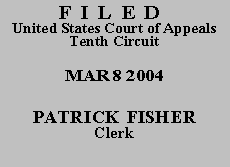 UNITED STATES COURT OF APPEALS
UNITED STATES COURT OF APPEALS
 UNITED STATES COURT OF APPEALS
UNITED STATES COURT OF APPEALS
| UNITED STATES OF AMERICA, | |
| Plaintiff - Appellee, | |
| v. | |
| MISTY LEE TEDFORD, | |
| Defendant - Appellant. |
In October 2000, appellant Misty Tedford pleaded guilty to one count of conspiracy to possess methamphetamine with intent to distribute, in violation of 21 U.S.C. § 846. Tedford was sentenced to a thirty-six-month term of imprisonment and a sixty-month term of supervised release.
Tedford began serving her term of supervised release on September 16, 2002. On April 7, 2003, the United States Probation Office filed a petition in federal district court recommending that Tedford's supervised release be revoked. The petition alleged that Tedford had violated four conditions of her release: (1) she had been convicted of a state crime while on supervised release, (2) she failed to notify her probation officer within seventy-two hours of her arrest on the state charge, (3) she failed seven drug tests, and (4) she had continued a relationship with a convicted felon.
A final hearing and sentencing on the revocation petition was held on June
3, 2003. At the hearing, Tedford stipulated that she had violated the terms of her supervised release. After questioning Tedford, the district court concluded that sufficient evidence existed to establish the violations set forth in the Petition and it revoked Tedford's term of supervised release. Although the United States Sentencing Commission's policy statement applicable to sentences to be imposed following the revocation of supervised release recommended a sentence of five to eleven months' imprisonment, U.S.S.G. § 7B1.4(a), the court sentenced Tedford to forty-eight months' imprisonment.
In this appeal, Tedford argues that the district court abused its discretion when it imposed a sentence in excess of the range recommended in the Sentencing Guidelines policy statement. "If the district court imposes a sentence in excess of that recommended in Chapter 7, we will not reverse if it can be determined from the record to have been reasoned and reasonable." United States v. Hurst, 78 F.3d 482, 483 (10th Cir. 1996) (quotation omitted). Tedford asserts that the sentence imposed is unreasonable.
Although the policy statements contained in Chapter Seven of the Sentencing Guidelines are merely advisory, the district court must consider them when it imposes punishment for violations of conditions of supervised release. United States v. Lee, 957 F.2d 770, 774 (10th Cir. 1992). It is clear from the transcript of the sentencing hearing that the district court did consider the policy statements. It referenced them immediately prior to imposing the sentence, and informed Tedford during the colloquy that the recommended sentencing range was five to eleven months. However, in the case of a revocation of supervised release where the sentence imposed is outside the range described in an applicable sentencing guideline or policy statement, 18 U.S.C. § 3553(c)(2) requires the district court to state in open court "the specific reason for the imposition of a sentence different from that described." Further, before imposing a sentence, the district court must also adequately consider the factors set forth in 18 U.S.C. § 3553(a). We have held that the court need not make specific factual findings relating to each factor, United States v. Rose, 185 F.3d 1108, 1111 (10th Cir. 1999), but it does have an obligation to explain its sentencing decision on the record. 18 U.S.C. § 3553(c); United States v. Zanghi, 209 F.3d 1201, 1204 (10th Cir. 2000).
In this case, the district court failed to give any explanation as to why it sentenced Tedford to a 48-month term of incarceration, a sentence clearly different from that recommended in the applicable Sentencing Guidelines policy statement. After delineating the violations to which Tedford stipulated and hearing testimony on Tedford's current circumstances, the court simply stated, "it is the judgment of this Court that the term of supervised release previously imposed in case number CR-000061-003 is revoked and you are hereby committed to the custody of the Bureau of Prisons to be imprisoned for a term of 48 months."
"[W]here there is no record of the judge's decisionmaking process, our review loses its appellate character and becomes instead a post hoc assumption of the district court's responsibilities." Zanghi, 209 F.3d at 1204. The district court's failure to provide any explanation for the sentence it imposed renders appellate review of Tedford's sentence impossible. We therefore remand this matter to the district court with instructions to resentence Tedford and to state on the record the reasons for the sentence it imposes, including, if applicable, an explanation consistent with the mandate of 18 U.S.C. § 3553(c)(2).
ENTERED FOR THE COURT
Michael R. Murphy
Circuit Judge
*. This order and judgment is not binding precedent, except under the doctrines of law of the case, res judicata, and collateral estoppel. The court generally disfavors the citation of orders and judgments; nevertheless, an order and judgment may be cited under the terms and conditions of 10th Cir. R. 36.3.